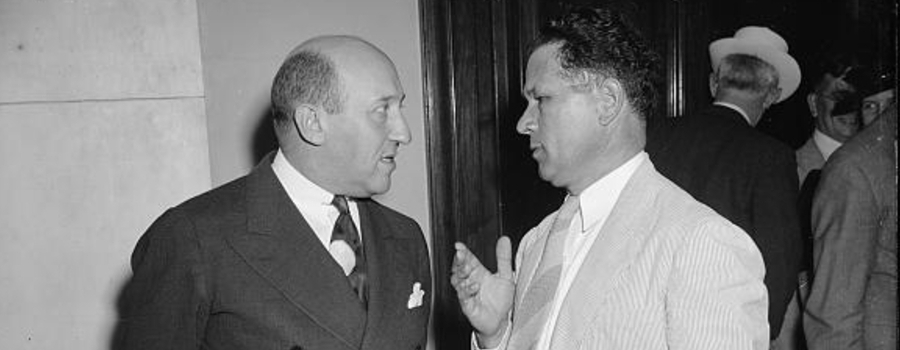
Photo: Dr. Morris Fishbein, President of the American Medical Association (left), and Senator Allen Ellender (right), discussing opposition to the National Health Act at public hearings in 1939.
Index of Information on the National Health Act
- Overview of the National Health Act
- Public Hearings on the National Health Act
- Report on the Health Security Act
- Introductory remarks and full text of S. 1620
- Bibliography of Historical Writings on the National Health Act
Overview of the National Health Act
A major National Health Conference was hosted by President Roosevelt's administration in Washington, D.C. from July 18-20, 1938, on the 141st anniversary of the U.S. Public Health Service. The conference brought together a full range of stakeholders, to discuss recommendations for reform that had been proposed by an interdepartmental committee.
Senator Wagner's National Health Act created federal funding to states for to expanding public health, maternal and child health services, medical care for the low-income, short-term disability insurance, hospital construction, and prepaid medical insurance. As Wagner mentions in his own testimony to Congress, the bill would have enabled states to use this funding towards universal or mandatory health insurance programs if they chose, but states were left broad leeway in how they used the funds to achieve the stated goals of the bill.
The American Medical Association strongly opposes the bill during public hearings on the bill in April 1939 (see below), and in an early 1940 press conference, President Roosevelt proposes a much more modest health reform plan and the expansion of hospital construction efforts, effectively killing the bill as the outbreak of World War II also demands more of Congress's attention.
Public Hearings on the National Health Act, S. 1620
In April 1939, the Senate Committee on Education and Labor convened a special Subcommittee on S. 1620. The Subcommittee, chaired by Senator James Murray, who would come to champion a national health program with Senator Wagner in subsequent years, held nine days of hearings titled “To Establish a National Health Program” from April - July 1939.
After the hearings, Senator Murray issued a preliminary report on S. 1620 (see below), recommending further study to address remaining concerns with the bill.
Report on the Health Security Act, S. 1620
Preliminary Report of the Committee on Education and Labor on S. 1620, titled "Establishing a National Health Program" (Report No. 1139, August 4, 1939):
 Loading...
Loading...
Introductory remarks and full text of S. 1620
Full text of the bill as submitted by Senator Wagner with introductory remarks to the Congressional Record on February 28, 1939:
 Loading...
Loading...
Bibliography of Historical Writings on the National Health Act
- Anderson, Odin W. "Compulsory Medical Care Insurance, 1910-1950," The Annals of the American Academy of Political and Social Science 273, Medical Care for Americans (Jan., 1951): 106-113.
- Derickson, Alan. "Health Security for All? Social Unionism and Universal Health Insurance, 1935-1958," The Journal of American History 80, no. 4 (Mar., 1994): 1333-1356.
- Falk, I. S. "Medical Care in the USA: 1932-1972. Problems, Proposals and Programs from the Committee on the Costs of Medical Care to the Committee for National Health Insurance," The Milbank Memorial Fund Quarterly. Health and Society 51, no. 1 (Winter, 1973), 1-32.
- Hirshfield, Daniel S. The Lost Reform: The Campaign for Compulsory Health Insurance in the United States from 1932 to 1943. Cambridge, MA: Harvard University Press, 1970.
- Huthmacher, J. Joseph. Senator Robert F Wagner and the Rise of Urban Liberalism. New York: Holiday House, 1971.
- Starr, Paul. “Transformation of defeat: the changing objectives of national health insurance, 1915-1980,” American Journal of Public Health 72, no. 1 (January 1, 1982): 78-88.
